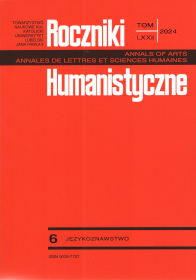Informal Language Learning in Online Interest Communities: A Review of Selected Research Methods
Informal Language Learning in Online Interest Communities: A Review of Selected Research Methods
Author(s): Anna Kaganiec-KamieńskaSubject(s): Social Sciences, Language and Literature Studies, Education, Foreign languages learning, Distance learning / e-learning
Published by: Towarzystwo Naukowe KUL & Katolicki Uniwersytet Lubelski Jana Pawła II
Keywords: online interest groups; English language; informal language learning; research methods
Summary/Abstract: Online interest groups respond to different social and emotional needs of their members. Web 2.0 allows them not only to receive and consume online content but also to participate, create, and share. Thus, these groups can also function as communities where informal language learning can occur naturally or with the help of others. This process and learning experience are worth studying, given the learner’s autonomy and, at times, the collaborative nature of this process. The objective of this article is to reflect upon English language learning in online interest-driven groups, focusing on the strengths and weaknesses of selected research methods such as virtual ethnography, grounded theory, and mixed methods. These methods may be helpful for researching informal language learning in online interest communities, as they may enable an in-depth examination and a better understanding of the researched context.
Journal: Roczniki Humanistyczne
- Issue Year: 72/2024
- Issue No: 6
- Page Range: 27-38
- Page Count: 12
- Language: English

